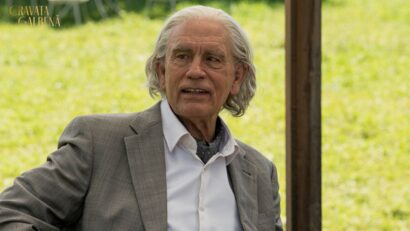“Aferim” by Radu Jude, winner of the Silver Bear for Best Director
Radu Jude's most accomplished and original feature yet is how Variety describes 'Aferim' by Radu Jude, winner of the Silver Bear for Best Director in the 2015 Berlin International Film Festival.

Corina Sabău, 21.02.2015, 09:08
“Radu Jude’s most accomplished and original feature yet,” is how Variety describes “Aferim!,” the third feature film by the Romanian director, after it was selected in the official competition of the Berlin International Film Festival held over February 5th-15th. The weekly appreciates the director’s choices and the way in which the prejudices of that time were brought on screen through the script written by Radu Jude and Florin Lazarescu, as well as the performance of the actors, especially of Toma Cuzin, and Marius Panduru’s black-and-white photography. In turn, the Hollywood Reporter also praises Radu Jude’s latest film: “It feels like a strong prize contender based on its striking look, timely subject and surprisingly funny script. Contemporary anti-Roma racism in Eastern Europe has inspired a string of powerful movies in recent years. But Aferim! digs deeper into the historical roots of this timely subject as Jude and his co-writer, novelist Florin Lazarescu, draw on real accounts of gypsy slavery for inspiration. Most importantly, they also manage to make this grim topic both funny and personal, not a dour social-realistic sermon,” The Hollywood Reporter also writes.
One of the largest-scale film projects in Romania in the last few years, “Aferim!” is a history lesson, with a plot set in the early 19th Century Wallachia, where gypsies were slaves. A constable, played by actor Teodor Corban, accompanied by his son played by Mihai Comanoiu tries to bring back a runaway gypsy slave, played by Toma Cuzin. “Aferim!” was shot in the Macin Mountains in Dobrudja, South-Eastern Romania and around Giurgiu, in southern Romania, on a budget of 1.4 million euros. Most of the set was reconstructed to recapture the Turkish influence. The name of the film is actually a Turkish word meaning “well-done.” Constanta Vintila-Ghitulescu, the historical adviser on this film, explains that “It is a question that has been asked for centuries, the question whether or not gypsies are human beings, and where they come from. It was a constant search, particularly in mid-19th century.” Here is director Radu Jude with more:
“The film is not only about slavery. But since this is a topic rarely discussed, gypsy slavery is what stands out. There are a lot of other themes that the film approaches, such as the role of women in society, religion, how ideas are passed on from person to person, tolerance, they are all present in the film. What I meant to convey is that a social phenomenon, just like a personal occurrence, is at least partially rooted in the more or less distant past. We often overlook this aspect. We should take some responsibility to the past, and sometimes we do not want to or find it difficult to take responsibility. I believe societies experience the same thing that Freud talks about with respect to individuals, namely that whatever we try to repress will always surface somehow. That is why, I believe it is important for any society to periodically remember more or less pleasant aspects in its history.”
According to film critic Andrei Gorzo, “the most important Romanian film since 2010, that is since Andrei Ujica’s ‘Autobiography of Nicolae Ceausescu’ and Cristi Puiu’s ‘Aurora’, is called ‘Aferim!’, and brings its director Radu Jude, born in 1977 and currently at his third feature film, very close to the leading position in the group of the most notable contemporary Romanian directors. This work of art, which will become a classic in the Romanian film industry, is also an echoing intervention on the agenda of the current public debates.” Here is director Radu Jude again:
“I had all sorts of sources of inspiration, and not all of them from cinema. Actually, what interested me most, was how you can make a historical reconstruction without deceiving the audience, giving them the illusion that they get a glimpse of life captured on camera. And here there are a lot of debates: some cinema theorists are against historical films, saying that this kind of films denies the fundamental nature of cinema. Anyway, I wanted to make a film, though it’s difficult to place it historically, so I wanted viewers to realize that what they saw was only a film and that they must question the respective images and come up with their own answers. In ‘Aferim!’ the convention is a little over-stated, which is neither a good nor a bad thing. It is only an attempt to warn the audience so as not to take things for granted.”
One of the intentions underlying his latest film, Radu Jude also says, is to make a comparative survey of the history of mentalities, to question some of the ready-made ideas and customs of the time. Radu Jude:
“What I have in mind are those people who have some openness to the communication involved in any work of art, including a book or a film. I used a sentence that impressed me a lot. Wittgenstein ends his first book saying that he hopes the book to be only a ladder for readers to climb, and in the end they should throw away the ladder and think for themselves. Of course, I’m not Wittgenstein, but this is what I’d like, too: I’d like my film to be a small step in a direction that the audience would follow on their own and get a lot farther than where the film takes them.”
A production by Hi Film, Radu Jude’s feature film, “Aferim!” will have its premiere in Romanian cinema halls in early March.






























